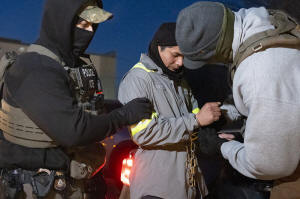Immigration officers say 'the worst go first,' but now there's no 'free
pass'
 Send a link to a friend
Send a link to a friend
 [January 28, 2025]
By REBECCA SANTANA [January 28, 2025]
By REBECCA SANTANA
SILVER SPRING, Md. (AP) — A week into Donald Trump’s second presidency
and his efforts to crack down on illegal immigration, federal officers
are operating with a new sense of mission, knowing that “nobody gets a
free pass anymore.”
A dozen officers from Immigration and Customs Enforcement gathered
before dawn Monday in a Maryland parking lot, then fanned out to the
Washington suburbs to find their targets: someone wanted in El Salvador
for homicide, a person convicted of armed robbery, a migrant found
guilty of possessing child sexual abuse material and another with drug
and gun convictions. All were in the country illegally.
“The worst go first,” Matt Elliston, director of ICE’s Baltimore field
office, said of the agency's enforcement priorities.
The Associated Press accompanied the officers, who offered a glimpse of
how their work has changed under a White House intent on deporting large
numbers of immigrants living in the U.S. without permission.
People considered public safety and national security threats are still
the top priority, Elliston said.
That is no different from the Biden administration, but a big change has
already taken hold: Under Trump, officers can now arrest people without
legal status if they run across them while looking for migrants targeted
for removal. Under Joe Biden, such “collateral arrests” were banned.
“We’re looking for those public safety, national security cases. The big
difference being, nobody has a free pass anymore,” Elliston said.

The number of collateral arrests has fluctuated, he said. By the end of
Monday across Maryland, ICE had arrested 13 people. Of those, nine were
targets and the other four were people ICE came across during the course
of the morning.
Of those “collaterals,” one had an aggravated theft conviction. Another
had already been deported once, and two others had final orders of
removal.
Changes to immigration enforcement under Trump
The administration highlighted the participation of other agencies in
immigration operations over the weekend, including the FBI, the Drug
Enforcement Administration and the Bureau of Alcohol, Tobacco, Firearms
and Explosives, which are part of the Justice Department.
Emile Bove, the acting deputy attorney general, observed arrests Sunday
in Chicago, a sign of the Justice Department’s growing involvement.
ICE’s daily arrests, which averaged 311 in the year ending Sept. 30,
stayed fairly steady in the first days after Trump took office, then
spiked dramatically Sunday to 956 and Monday to 1,179. If sustained,
those numbers would mark the highest daily average since ICE began
keeping records.
Trump also has lifted longtime guidelines that restricted ICE from
operating at “sensitive locations” such as schools, churches or
hospitals. That decision has worried many migrants and advocates who
fear children will be traumatized by seeing their parents arrested in
the drop-off line at school or that migrants needing medical care won’t
go to the hospital for fear of arrest.
Elliston pushed back on those fears, saying it’s been exceedingly rare
for ICE to enter one of those locations. In his 17 years on the job, he
said he’s gone into a school only once and that was to help stop an
active shooter.
[to top of second column]
|

U.S. Immigration and Customs Enforcement officers use a chain to
more comfortably restrain a detained person using handcuffs
positioned in front, Monday, Jan. 27, 2025, in Silver Spring, Md.
(AP Photo/Alex Brandon)

He said the removal of other guidelines that had restricted ICE
operations at courthouses makes a bigger difference in the agency’s
work.
But getting rid of the sensitive locations policy does affect ICE in
more subtle ways.
For example, at one point Monday, the team stopped at a parking lot
in hopes of catching a Venezuelan gang member who was believed to be
working as a delivery driver at a nearby business. Across the street
was a church, and one street over was an elementary school, which
under the previous guidance would have made it off limits to park to
do surveillance.
Some enforcement policies have not changed
What has not changed, Elliston said, is that these are targeted
operations. ICE has a list of people they’re going after as opposed
to indiscriminately going to a workplace or apartment building
looking for people in the country illegally.
“I really hate the word ‘raids’ because it gives people the wrong
impression, as if we’re just arbitrarily going door to door and
saying, ‘Show us your papers,’" he said. “Nothing could be further
from the truth.”
In the week since Trump returned to office, Elliston said he’s
constantly been on the phone, trying to dispel rumors about what ICE
is doing and who is getting arrested.
Since starting his job in 2022, Elliston said he’s worked to build
relations with elected officials and law enforcement agencies across
Maryland, a state where many communities have sanctuary policies
limiting their cooperation with federal immigration authorities.
Elliston has reached out to cities to educate them about what ICE
does and whom officers pursue. He also tries to build relationships
with city officials so they feel more comfortable letting
authorities know when migrants who have been detained are going to
be released. That way ICE can get them.
Another thing that hasn’t changed? Sometimes when looking for
someone, they come up empty.
In one apartment building in Takoma Park, just outside Washington,
three ICE officers pounded on the door of an apartment, asking
whoever was inside to come to the door.

“Miss, can you open up?” the officer said. “Can you come to the door
and we’ll talk to you? ... We’re going to have to keep coming back
until we clear this address.”
Eventually a man who lived at the apartment came home and talked
with the ICE officers. It turned out that the person they were
looking for likely gave police the wrong address when he was
arrested and he didn’t live there.
If they cannot find a person, Elliston said, they keep looking.
“Looking for these guys will never stop,” he said.
All contents © copyright 2025 Associated Press. All rights reserved |